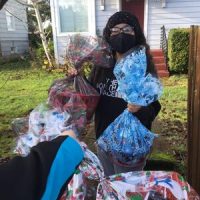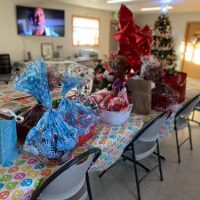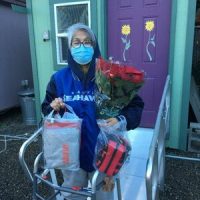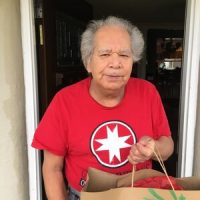2020 has been a year of many trials across Indian Country. Across our many Nations, rural, city and everywhere in between, we are all coping with the catastrophic effects of the COVID-19 virus. We have missed gatherings, ceremonies, and the everyday celebrations as part of quarantine and to keep those we love safe. Our loved ones lost during this time often died alone, while those of us left behind have had to mourn them without the touch and care of being physically together. Left to pick up the pieces as we try to move forward has left so much anxiety and depression in our young, elders, and even us adults. We have had to learn to be inventive in how we interact with, provide for, comfort, and grieve as communities. All to protect what is important to us.
As Indigenous people we have always been strong, resilient, and giving. That is what I want to highlight in this article. This article is about the people and the Native organizations that have stepped forward to fight for our families in this time of crisis. That is why I asked to do a series highlighting the strength and beauty that I see surrounding my Urban Native community here in Washington state during the COVID-19 pandemic.
This first article is about the Urban Native Education Alliance, Seattle Clear Sky Native Youth Council (Clear Sky) under the guidance and care of UNEA Co-Founder Sarah Sense-Wilson, Oglala, Lakota. Sarah is an advocate for our children in many ways but most of her work has been with Seattle Public Schools public education system. Sarah offers important tools and strategies for students to speak up and out on issues as they struggle to maintain and grow their cultural identity in a chaotic and forgetful system.
Clear Sky was born from a small group of urban Native youth in Seattle. These youth were empowered enough to speak out about the educational system they were raised in. Based on their experience with misrepresentation, feeling invisible within this system that lacked adequate resources or basic knowledge of their Native students within SPS. Clear Sky predated the invention of UNEA and ultimately was the inspiration for UNEA. Clear Sky was founded by Seattle Public School Native students; Dallas Pinkham, Julia Wilson Peltier, Tiana Woods, Cheyenne Wilson and Myleaka Webster.
The Clear Sky Founders original goal was to organize a city- wide inclusive Native student alliance. The beginnings were humble, with once a week ‘talking circles’ at Indian Heritage. Clear Sky had no grant funds or sponsorship to support lifting indigenous student’s voices or their vision of their future within the SPS system. As with most grassroots organizing families, parents and volunteers coalesced to support students’ with their plans, their hopes and their dreams for Clear Sky’s future.
SPS Indian Education Department under Will Bill Jr. provided Clear Sky assistance by opening the building and gym for us to gather once a week. Eventually Clear Sky had to partner with Seattle Police Department Police Activities League for required rental insurance and, after about one-year CS students agreed to be enveloped into UNEA. (Information provided by Sarah Sense-Wilson)
Since that time the guiding foundation of UNEA is to provide youth with role models, leaders, and mentors. UNEA mentors, and coaches encourage youth to raise their voices for betterment of ALL urban Native youth, and with confidence to know we (UNEA Volunteers) will always be there for support and encouragement. Over the years, even through multiple forced relocations and after being evicted by SPS, Clear Sky overcame these trials to rebuild and create a safe place for our Native children. “Seattle has historically been a city of pseudo equity initiative for equity and opportunity for our Native children.” States Sarah Sense-Wilson. For Clear Sky providing identity and a safe space is the goal to foster cultural continuity. As a mother of three Native children, I am forever grateful for the nurture and care UNEA, Clear Sky created for my children growing up as Urban Native Americans.
I was lucky enough to get to interview with volunteers and youth leaders actively working with Sarah to provide much needed aid to our Urban Native community. The youth interns and program volunteers spoke to me about their initial awareness of COVID-19, all had some fear and anxiety. What impressed me about these young people is none of them let their fear cripple them. Instead working with Sarah Sense-Wilson as volunteers they reached out to help and protect others. They came together as a collective to protect the most vulnerable of our communities.
The help began as kind gestures as Sarah and her staff worked hard to find relief funding. Instead of stopping tutoring, the UNEA council immediately switched their in person tutoring to zoom tutoring to keep students and mentors safe while still providing them with important tutoring and contact. Sarah and her hardworking staff began to outreach to families and elders. They delivered flowers on Mother’s Day, Winter Jackets for our children, Care packages to elders and so much more.
In the words of Clear Sky youth Interns:JJ, Aleut Nation: It’s not only youth, Clear Sky has opened their doors to everyone in our community.
Kayla, Chippewa and Assinboine Sioux Nations: “Sarah is one of the most selfless people I know”. Kayla went on to say how the Clear Sky program has been there for her and how her family have personally been helped by UNEA also.
Leilani, Blackfeet Nation: “Working with UNEA helps me redirect myself, it helps distract me from my own anxiety and they have helped to empower my voice.”
Gia, Vietnamese, Lao, Teochew: Clear Sky is a very welcome, open arms program. Sarah is very proactive at being one step ahead in relation to the current happenings/ needs within the Native community.
Brooke a Volunteer and Ally to Native youth, talks about being a teacher at the time the Seattle School’s closed down. Brooke said she was impressed with how immediately after the school closures Sarah outreached to the Native community. “Sarah had a meeting to work out logistics and jumped right into how can we help our kids?”
My Interview with UNEA, Clear Sky Volunteer/Co-Founder Sarah Sense-Wilson (Oglala):
Individually, or as an organization, when did you first learn about COVID and did you foresee any long-term impacts COVID would have on how your program interacts with our Native families?
“I learned about COVID when the nursing home in Kirkland had the first known regional outbreak. I did not foresee any initial long- term impacts until the tribe I work for shut down. It was at that point I started to contemplate what the long-term affects might be for Indian Country and beyond. Our families in Seattle
have been greatly impacted due to socio-economic and health disparities. It is well documented urban AI/AN have disproportionately higher homeless rates, higher rates of poverty, multiple barriers to health care, and we already have the highest drop -out rates for public education in Seattle. So, the perfect storm has landed, and we have had to develop new skills, and strategies to reach our families and pursue funding to meet the needs of our families. UNEA is uniquely versatile and adaptable even when UNEA was homeless we found solutions for supporting our youth. Operationally not having a facility was not as big a barrier for us. As tribal people we are incredibly resourceful, adaptive, innovative, and creative in how we network and carve out passageways for supporting one another. The city wide shut down happened in late March and by April we received our first COVID relief grant through Nia Tero and other funders allowed for critical services to mitigate hardship and crisis experienced by many of our Clear Sky and Native Warrior (NWA)youth and families.”
What where your initial thoughts, reactions to the pandemic and how did you, as an organization, decide to respond?
Initially, UNEA started seeking funds for supporting outreach and technology needs of our students. We did online fundraising and grant writing for increasing our pool of funds, in addition other Native non-profits such as Nakani, and Nahahilee and Unkitwa formed alliances for consolidating and sharing our resources. Our board members immediately regrouped to prioritize essential needs of our families and students. We developed policies and strategies for moving UNEA from an education focused organization to a quasi-social service- approach. Simultaneously we began a campaign of hope, optimism and encouragement with social media messages of inspiration. Whenever possible we found various gifts that helped brighten the lives of our families, i.e. mother’s day bouquets (Unkitwa donated), traditional medicines, sports/fitness equipment (King County Parks and Recreation U Play), in addition to our regular weekly food/supplies deliveries. We launched our Elders Care Project with one intern making weekly calls to volunteer participating elders as ‘wellness visits’. The elders seemed to really appreciate being watched over and cared for by our Intern, and the project culminated in a personalized gift basket including traditional medicines, teas, gift cards, traditional foods, and quality native owned lotion/sprays and candles. This project concluded in July, however based on results from the Elders Project surveys and overwhelming feedback we recently rebooted the project to include our youth paired with volunteer Elder participants. The goal is to strengthen the enduring multigenerational connections through regular and consistent communication and cultural exchange. Youth gain valuable knowledge and learn stories of the community while elders have an opportunity to build bonds with genuinely caring and interested young people.
One of the popular online activities through Native Warrior Athletics was our various fitness and health challenges. These challenges helped to keep our youth and families engaged in interactive physical activities in hopes of winning gift cards and other prizes. The most memorable online activities was the ‘Wall- sit Challenge’. NWA coach Cullen Zackuse demonstrated on live facebook stream, and while live streaming Cullen slipped and toppled over several times, and his attempts to regroup fell short of hysterical, the laughter shook through the internet. Another notable and popular challenge was our ‘Jump Rope Challenge’, UNEA distributed over 65 jump ropes to our families. In all UNEA distributed over 400 pieces of health, fitness, and exercise equipment to youth of all ages.
Clear Sky has continued to provide both virtual and limited in-person (outdoors) social distancing activities and workshops throughout the Spring, summer, and fall. Some workshops included Leadership/Public Speaking, Black Lives Matter and Indigenous Allies, Smoking Cessation prevention Art project, and Job Skills/Tools and Interviewing techniques.
Our most exciting project is the recent launch of our inaugural Clear Sky Academy project. CSA is the beginning of our vision for a Native focused High School. CSA is in partnership with Yellow Wood Academy to offer high school OSPI credit and the course is hybrid model instruction with the student option for virtual or in person learning. The course is called ‘American Indian Historical and Contemporary Experience’. UNEA is still offering tutoring bi-weekly either in-person or virtual. We also are now working with student Interns to support training in advocacy and leadership through a combination of mentorship and experience with civic service and regular public speaking and presentations opportunities. Our Interns assist UNEA as consultants, advisors and provide us feedback and support when planning and developing project ideas and activities.
How has Clear Sky, UNEA responded to meet the unique needs of our Urban Native Community?
UNEA has responded to the unique needs of our families by supplying youth with various technology such as; Chromebooks, laptops, study equipment, printers, and supplies for our students and families. Supplies and equipment were partially donated by Nakani and funded with Covid relief funds. We also make our weekly Community Outreach process was simple and easy process for participating families and elders. We customize each order to the specific needs of each family. Typically food banks and charitable organizations do basic ’food boxes’, but for many of our families and elders there are dietary and health restrictions and considerations. Our volunteer outreach team are trained and well prepared each week to shop and deliver custom orders to each family. Our cadre of youth and community volunteers meet up every Saturday 8am to plan out and complete the shopping and deliveries for families. We often include special gifts such as pumpkins, or poinsettias, or PPE, and Hat and glove sets.. Most recently we started to distribute winter coats, and Disaster Relief Kits too. Our intentional effort to fill the gap wherever needed helps to make life during Covid more tolerable and less stressful for families. Our community has experienced surging waves of grief both from daily losses but also mourning death of loved ones, coupled with historical and intergenerational trauma re-experienced due to pandemic illness spreading throughout Indian Country. Mitigating the pain, sadness, grief, and sorrow has become a priority. Our collective spiritual, mental, emotional and physical health, requires focused and intentional nurturing, and we all need moral support during Covid. Covid’s impact has changed our lives forever and I believe our urban Native community has grown stronger together.
How have you seen COVID-19 affect our Native families, youth, elders, bad and good?
Covid has impacted our Native community in a variety of ways both positive and negative. For youth I notice some are experiencing suicidal urges and attempts, withdrawal and anxiety and depression symptoms more extreme and severe then pre- covid. I’ve noticed some youth are fully utilizing zoom and resources we offer and appear to be adjusting without too many negative affects. I do see how some youth are having difficulty with how prolonged the social distancing requirements have lasted. Some youth have had to experience covid in their families and have lost loved ones due to covid or during covid. Some youth are highly engaged in our program and stay active in UNEA programs.
Some Elders have a lot of family with them and are supported and other elders have not much extended family or support and enjoy participating in our Elder’s Care project.
I would say stress levels are high across the board and across all generations. Because this second wave has hit our tribal communities throughout Indian Country. Positive covid rates are sky rocketing, and this causes us all to be triggered and experience anxiety, fear, worry and sadness.
A positive from Covid has been our ability to collectively work together, consolidate resources and strengthen lines of communication and support for one another. Using ingenious strategies, including deliveries, mailing items/cards, and using zoom, livestream and other social media platforms. One example highlighting the innovative approaches is our Annual Billy Mills Run/Walk Event. UNEA used both virtual and in-person Run/Walk event at Greenlake. The entire process was learning curve for most of us, first time using apps and other social media platforms for reaching people across the country. The event was highly successful raising over 5,000 towards Clear Sky Academy.
What do you think the future holds for healing after the COVID-19 pandemic? How do you see UNEA’s role in the healing process?
Post Covid, we will likely want to host celebrations and healing circles and ceremonies to acknowledge the grieving/mourning due to the many big and small losses experienced in the past 10 months. We need to openly process the range of feelings and emotions we have been experiencing over the course of the past year.. Many ceremonies have been cancelled, postponed or changed to adjust based on our safety and concerns. Seasonal Cultural/traditional activities have also been cancelled which again has become another loss for many of us. UNEA is hoping to continue to offer support for our youth and families to heal, we have a great partnership with Unkitwa and we had planned sweatlodge before the new governor orders were issued 2 weeks ago. We hope to bring youth to regular sweat lodge and continue to have opportunities for wellness and health activities.
What services can our Natives in King County apply for through Clear Sky? How can others help?
Right now UNEA is trying to limit services to Seattle area only. Mainly because our Covid funds are exhaustive and are quickly diminishing. Community Outreach, CSA, Elders Project, Internship, Clear Sky programming, tutoring (ages 9-19). We are always in need of volunteers too.
Is there anything you would like to add about your experience during the COVID-19 pandemic as an organization, or on a personal note as part of our beautiful indigenous community?
“I would like to express gratitude, appreciation, and love to all our volunteers, our partners, and funders for bringing forward the best of who we are as a community. We have many talented, gifted and caring individuals wanting to lend their resources or skills, ideas, and support to the collective health and wellness of our beautiful community.” ~Sarah Sense-Wilson Oglala Sioux Co-Founder of Clear Sky and UNEA.
 Throughout each interview with everyone of UNEA’s amazing volunteers and Sarah herself, I was overwhelmed with their strength and dedication to the Native families here in Seattle struggling through this pandemic. Their dedication and respect for each other and the families they serve shine through in everything they do. The future leaders I met and spoke with showed me their strength and determination for our future.
Throughout each interview with everyone of UNEA’s amazing volunteers and Sarah herself, I was overwhelmed with their strength and dedication to the Native families here in Seattle struggling through this pandemic. Their dedication and respect for each other and the families they serve shine through in everything they do. The future leaders I met and spoke with showed me their strength and determination for our future.
Whether it is getting out there every Saturday at 8:00am to deliver supplies and groceries, or wellness checks with elders, it is truly heartwarming to witness organizations such as UNEA stepping into roles to show us the tomorrow we can create together. I for one am grateful to be a part of this beautiful Urban Native Community, thank you Urban Native Education Alliance, Clear Sky and Native Warriors for all the hard work, vision, and leadership during these chaotic historical times of uncertainty.
Rae Rose is a Pacific Northwest author of Paiute, Mayan, and Japanese heritage. She writes historical fiction, poetry, picture books. “Stories are very important to me, I hope you enjoy these stories I share with you.”





